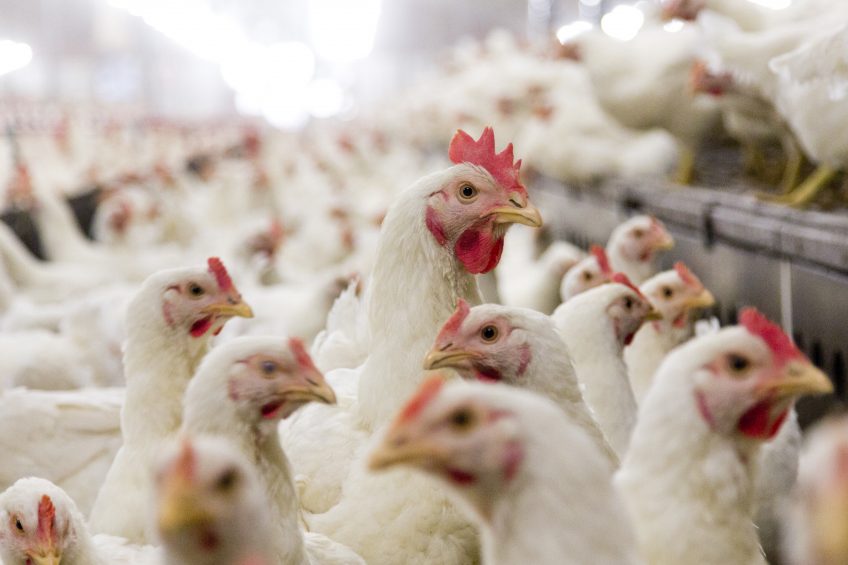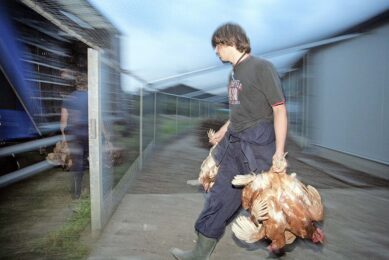RSPCA launches campaign over broiler welfare

The RSPCA is planning to ramp up the pressure on the UK poultry meat sector with a ‘big push’ on welfare conditions on broiler units.
The charity told Poultry World that, ultimately, it wanted to bring about change on broiler farms on the scale seen in egg sector’s switch from caged to non-caged system in the egg sector.
Shoppers’s double standards
Head of farm animals at the RSPCA Marc Cooper said the aim was to highlight what he described as shoppers’ “double standards” when it came to buying eggs and poultry meat.
“On the one hand consumers will select free-range eggs because of the welfare standards associated with their production. But then they won’t follow the same principles and thought processes when buying meat.”
Customer welfare support for layers higher than for broilers
Dr Cooper said there was tremendous support for higher welfare eggs with roughly 51% of shoppers buying eggs from non-cage systems.
However, when it came to poultry meat only 10-15% chose birds from higher welfare systems.
“It is the same species so there shouldn’t be the difference. It is time to have a big push to encourage shoppers to think again about their buying choice,” he said.
Campaign to encourage sales on slower growing bird
The campaign will highlight broiler production as the biggest challenge to the welfare of chickens, and will centre on bird growth rates on commercial broiler units.
Work is already underway behind the scenes with the major retailers but the main thrust of the consumer focus is likely to be to urge shoppers to buy poultry meat from slower-growing breeds.
Most welfare issues down to growth rates
“The most significant welfare issues are down to very fast growth rates. Breeds grow from hatching to 2.2kg in little over a month, resulting in an immature skeleton with significant muscle mass,” Dr Cooper said.
The over-developed muscle puts pressure on internal organs, causes hock damage and leads to relatively higher mortality rates of between 4-8.8% among birds conforming to the base industry standard welfare, he suggested.
RSPCA to look at whole production chain
Dr Cooper added that the RSPCA was looking at the whole broiler production chain.
“We have deep concerns about the whole process as the parent birds in the hatchery exhibit the same trait in growth rates. But their weight is held back by restricting feed,” he added.
The campaign would highlight these issues to the public and would draw a comparison between growth rates in broilers and those in humans.
“If these growth rates in broilers between hatching and culling were scaled up to an equivalent in humans, a child would weigh 28 stone by its third birthday.
“It is a powerful comparison that we hope will demonstrate just how fast these growth rates are.”
BPC: farmers should be applauded
But British Poultry Council chief executive, Richard Griffiths, said that welfare on UK farms was already the “first priority of the organisation, companies, and farmers”.
“Through the Red Tractor we have a set of very good and ever-improving standards that continually reflect the progress being made in the science of welfare and are applied to over 90% of the birds grown in this country,” Mr Griffiths said.
“These are implemented by our dedicated and skilled farmers for whom bird husbandry is a passion, and whom should be applauded for the fantastic job they do of feeding the nation.
“British consumers trust the Red Tractor and know that it delivers wholesome, nutritious, and affordable food. Consumers have made poultry their most popular source of protein, with just under half of the meat we eat in the UK being poultry.”
Code of Practice for broiler welfare needs undating
However, Mr Griffiths added that the British poultry industry was keen for the government to finish updating the Code of Practice for broiler welfare, as the current standards were extremely outdated.
“The BPC has been working with experts from across many stakeholders to bring forward a new guidance document that brings welfare regulation up to date with current practice.
“We urge the government to get this in place so that, along with the Red Tractor standards, welfare practices in this country are transparent and reflect modern thinking.”
Targeting producers
In conjunction with the message to the consumer the charity is promoting alternative production systems. It will highlight production standards on RSPCA Assured farms, which stipulate the use of slower growing breeds.
They also make provision for daylight in the broiler house, perches and straw bales to allow birds to express a wider range of behavioural instincts.
Dr Cooper said: “We want poultry producers to think about the economics of adopting higher welfare standards – which do add up.”
Extending rearing by 10 days
He reckoned that it took roughly 10 days longer to rear the bird to shop weight giving it a significantly longer life. But the extra costs were offset by higher retail prices of about £1-£2 per bird.
In addition, Dr Cooper said mortality was 0.4-3% lower, and birds developed fewer foot pad problems and hock lesions, meaning more value in markets that make use of these parts of the carcass.
Dr Cooper pointed out that the extra cost on the shelves should not deter the consumer.
“We will highlight the, still, extremely low cost of higher welfare chicken which, gram for gram, is only a third of the price of a Mars bar,” Dr Cooper said.
Poultry meat from spent hens
A further strand of the campaign is expected to be to encourage the use of poultry meat from so-called spent hens.
Liam Kurzeja, RSPCA Assured marketing manager, said that currently there was little market in the UK for end of lay hens with the bulk of them being frozen and shipped abroad or being used as cheap ingredients for pet food.
But Mr Kurzeja said ex-laying hens could be an attractive, competitively priced, alternative to the traditional broiler chicken.
“They could come with the added bonus of being free-range – and RSPCA Assured – an opportunity that could offer food service businesses a significant advantage over their competitors in a market where free range chicken meat is rarely an option,” he said.
Mr Kurzeja said that there was sufficient demand for higher welfare to make the option viable.
And he called on retailers and processors to contact the RSPCA and register their interest.
Join 31,000+ subscribers
Subscribe to our newsletter to stay updated about all the need-to-know content in the poultry sector, three times a week. Beheer
Beheer








 WP Admin
WP Admin  Bewerk bericht
Bewerk bericht